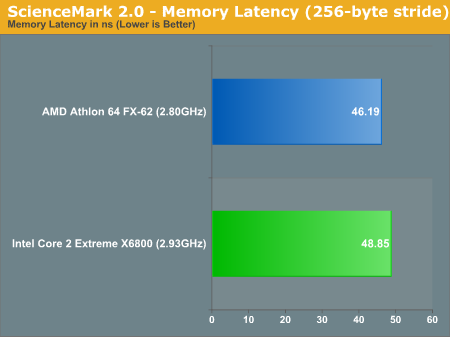Intel Core 2 Extreme X6800 Preview from Taiwan
by Anand Lal Shimpi & Gary Key on June 6, 2006 7:35 PM EST- Posted in
- CPUs
Memory Latency and Bandwidth
We've never been able to look at some of the low level characteristics of Intel's Core architecture, and although we didn't have enough time to do a thorough run of low level benchmarks we were able to run ScienceMark 2.0 in order to get an idea of how the Core 2 Extreme stacked up against the FX-62 in terms of memory latency and bandwidth.
We had seen Conroe performance results that showed the new architecture being able to offer fairly competitive memory access latencies to AMD's architecture, without the need of an on-die memory controller. Our ScienceMark 2.0 results confirm just that:
While AMD still offers lower memory latency, the Core 2 Extreme X6800 is very close in comparison - especially considering that it has no on-die memory controller. With lower clock speeds than its Pentium D siblings and a faster FSB, memory access latency is reduced tremendously with Conroe. On a larger scale, through a very effective cache subsystem as well as memory disambiguation, Conroe can offer significantly improved memory performance compared to its predecessors, including the Athlon 64 X2/FX.

ScienceMark's memory bandwidth results offer a very telling story, showing us the bandwidth limitations of Intel's FSB architecture. While the FX-62's peak theoretical bandwidth is not achieved in real world, you can see how AMD's Direct Connect architecture offers higher limits for chip-to-chip communication.











134 Comments
View All Comments
peternelson - Tuesday, June 6, 2006 - link
"once Core 2 Duo is available"who said it was going to be AVAILABLE ? ROFL
Maybe for Christmas? After Dell and Alienware get their orders to the front of the queue.
JarredWalton - Tuesday, June 6, 2006 - link
Almost makes you want to grab one of the cheapest Dell systems just to get the CPU, then sell off the rest. Almost. I would guess Core 2 Duo will be available in the retail market, but just with prices 20-50% higher than what we're currently listing. Over time, the prices will drop to more reasonable levels. Probably post-Christmas is when widespread availability at normal prices will occur.bob661 - Tuesday, June 6, 2006 - link
That sucks for the early adopters. I guess my wife will get an upgrade next summer.peternelson - Tuesday, June 6, 2006 - link
Yeah buying a Dell is desperate but could work.But then how do you know they took proper anti static precautions building it ?
Furen - Tuesday, June 6, 2006 - link
If the CPUs will be in short supply you can bet Dell will price these quite high. Dell will still have crappy Celerons and Pentium Ds to throw into cheat systems.NeonAura - Tuesday, June 6, 2006 - link
Guess that's the nail in the coffin for AMD's current revision. Intel looks to have the top.neweggster - Tuesday, June 6, 2006 - link
In regards to that what would you think could give AMD any performance lead? If im right by all the benchmarks. Intel is the crown here, how can AMD catch what steam has been converted into pure power for Intel here? I don't see anyway AMD can be crowned anything in performance, or are you refering to some benchmarking that really doesn't effect gamers and high end performance junkies?
I am a bit concerned for AMD here as intel is actually pulling so hard ahead of AMD in performance on its new cores that im afraid poor old AMD can't catch up. If you look at what Intel is providing now vs AM2 its clear that every new release of new tech from intel is far advanced and performing well ahead in the benchmarks.
Regs - Wednesday, June 7, 2006 - link
This is actually good. The CPU desk top market has been so stagnant lately. I'm tired of the same old 5% performance boost upgrades. Of course, when you over clock an architecture -- scalability isn't in your vocabulary. Who here upgrades a 2.0GHz A64 to a 2.4GHz A64? Doesn't happen often.AMD's future is looking brighter than ever today actually then when it was holding the huge performance crown (presently still does). In a business sense a fast performing car can only get you so far when there is a blind man behind the wheel.
Do not doubt AMDs performance envelope has ended. They have plenty of room to improve and show how far they can take their intuitive designs.
AnnonymousCoward - Wednesday, June 7, 2006 - link
It's not that dire. Remember when the Athlon 64 was released, and AMD had a 20% advantage in Half Life 2 performance over similarly priced Intel CPUs? Intel still came back. AMD is a big company, and it's not like one processor that finally beats AMD (an Intel first in ~4 years) will put AMD in serious trouble.Calin - Wednesday, June 7, 2006 - link
Intel had the advantage over AMD in laptop performance/watts (and marketing oomph with Centrino). Now, Intel will have the advantage in desktop and laptop performance. As long as AMD keeps their advantage in the servers arena (where real money are), AMD is not in trouble.When the Conroe will transition to servers, people will think: "Better performance and lower thermal? At lower price? From Intel? Where do I sign?". That will be trouble for AMD